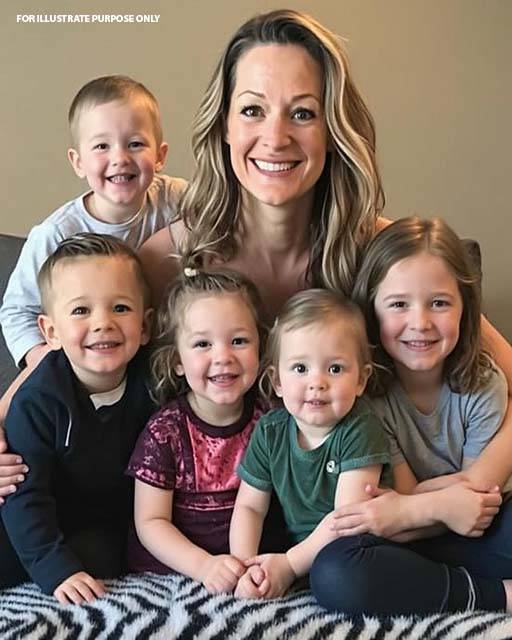From Rock Bottom to Rebirth: The Letter That Changed Everything
I thought my life had hit its lowest point when the eviction notice arrived. But then came a letter—unexpected, mysterious, and from a stranger—that would turn everything around in a way I never could have imagined.
When I saw that paper taped to our apartment door, I felt like the air had been knocked out of my lungs. Thirty days. That’s all we had left. I had no savings, no job prospects, and no idea where my five children and I would go next.
But three days later, amid the stack of unpaid bills, I found a plain white envelope. No return address. Just my name, “Rebecca Thomas,” written in careful cursive.
I almost didn’t open it. I couldn’t take more bad news.
Instead, I found an invitation.
To a gala. Hosted by none other than Nicholas Devlin—the elusive tech billionaire known for his unpredictable acts of generosity.
The note ended with one haunting line:
“This evening holds a gift for someone in need.”
My heart raced.
“Mom?” my daughter Lily asked, snapping me back to reality. “You okay?”
I managed a smile. “I… I’ve been invited to a gala.”
Her eyes widened. “Wait, like, with gowns and fancy food?”
I nodded slowly. The idea seemed absurd. I was a grieving widow, a single mother who hadn’t worn lipstick in a year, let alone a formal dress.
But something inside whispered, This could be your chance.
On the night of the event, I slipped into the only black dress I hadn’t sold and hugged my mother goodbye as she stayed behind with the kids.
“Maybe this is the beginning,” she whispered.
The Carlton Grand Hotel looked like something out of a fairy tale—crystal chandeliers, elegant music, men in tuxedos, women in designer gowns.
I felt out of place. Small. Overwhelmed.
Then the room fell silent.
Nicholas Devlin appeared on stage. Tall, poised, and with a quiet power that drew everyone’s attention. He spoke about purpose, about giving, about second chances.
And then he said my name.
“Rebecca Thomas.”
I froze.
He continued, “A mother of five. A woman who’s endured unimaginable loss with unimaginable strength. Tonight, Rebecca, I give you and your family a home.”
Gasps echoed across the ballroom. Applause followed.
My knees nearly gave out. I was pushed gently toward the stage. Tears blurred my vision as I stood before the man who had just changed my life.
“Is this real?” I whispered.
“It’s very real,” he said with a warm smile. “This is your new beginning.”
Two days later, we stood in front of a beautiful house that looked like something off a postcard—wraparound porch, flower garden, soft sunlight flooding the entryway. My children ran laughing through the halls.
“Mom, there’s a POOL!” my son shouted.
Lily, wide-eyed, looked at me. “This is ours?”
I nodded, still stunned. “Yes. It’s ours.”
And for the first time in years, I felt like I could breathe.
But the story didn’t end there.
In the master bedroom, on the neatly made bed, sat another envelope. The same handwriting.
“Dear Rebecca,” it read.
“This home is just the beginning. I believe in your story—and I’d be honored if you’d be the face of this initiative. Share your journey. Inspire others. If you’re willing, this is only the start.”
At first, I panicked. What was the catch? Was I just a feel-good story for headlines?
But then Lily asked the question that changed everything:
“Would it help people like us?”
That’s when I knew. Yes, it would.
So I said yes.
In the months that followed, our lives changed in ways I never dreamed possible.
Nicholas launched a campaign called Second Start, with our family as its heart. We told our story on national TV, in newspapers, on social media. We talked about grief, poverty, strength, and survival.
And people listened.
Letters poured in—from parents, widows, veterans, survivors. People who saw their own struggles in ours.
One woman from Maine wrote, “You gave me hope.”
A father from Ohio started a fundraiser for displaced families. A teenager in Chicago said she now wanted to become a social worker.
One night, Lily and I sat at the kitchen table reading letters from strangers whose lives had been touched.
“Look what you’ve done,” she said.
“No,” I said softly, pulling her close. “Look what we’ve done.”
We didn’t just get a house.
We got our dignity back. Our strength. Our voice.
And through it all, I stopped feeling like a statistic. I started feeling like a human being who mattered. A mother. A woman. A survivor.
All because of a single envelope… and the courage to say yes.
